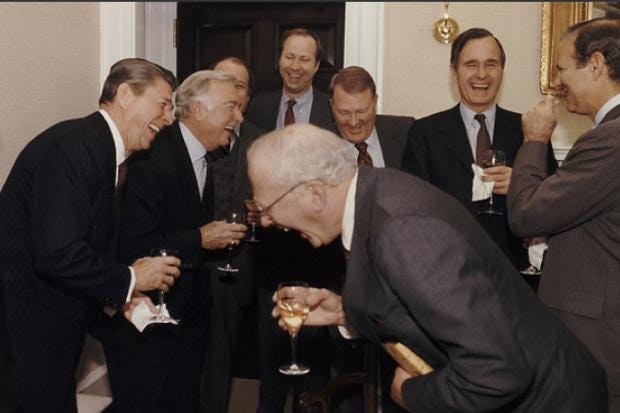Yet Another Report Shows That The Inflation Is Made Out Of Corporate Profits
Greedflation is killing us.
A new report from the progressive think tank Groundwork Collaborative reveals that more than half of the recent inflation in the United States is driven not by supply chain issues or higher wages or even shoplifting but to corporate greed.
The issue is “greedflation.” Manufacturers, for a time, paid more to make their products due to supply-chain issues resulting from COVID and the war in Ukraine. But now that they are not dealing with those issues anymore, they aren’t passing the savings onto consumers — they’re keeping the profits for themselves.
“While prices for consumers have risen by 3.4 percent over the past year, input costs for producers have risen by just one percent,” the report explains. “For many commodities and services, producers’ prices have actually decreased.”
So they’re paying less to get the product to you and you’re paying more because “you’ll pay more.”
“While labor and nonlabor input costs have played a role in price increases, corporate profits drove 53 percent of inflation during the second and third quarters of 2023 and more than one-third since the start of the pandemic. Comparatively, over the 40 years prior to the pandemic, they drove just 11 percent of price growth,” the report reads.
“Corporate profits as a share of national income has skyrocketed by 29 percent since the start of the pandemic. While our economy has returned to or surpassed its pre-pandemic levels on many indicators, workers’ share of corporate income has still not recovered,” it continued.
And there’s even a handy-dandy graph showing just how far labor’s share of the profits have dropped.
The traditional American capitalist view of things is that in a free market, competition and supply and demand will always lead to the most fair and reasonable price for things.
But it’s not a supply and demand situation as much as it is a boiling-the-frog situation. Consumers acclimated to paying higher prices for items because they knew there were supply-chain issues and that everyone was hurting all over. Then, when those issues went away, the CEOs figured, “Hey! Why bring our prices down now that we know they’ll pay this much?”
Rather than competing against each other, corporations have almost collectively decided to keep their prices as high as possible.
None of the things that are supposed to occur to keep prices fair are working, so clearly we have to find something else that does.
Americans tend to skeeve price controls, largely due what happened back when President Richard Nixon tried to do them. In response to a serious inflation problem in 1971, Nixon implemented a three-month price freeze on most products, rent and wages. The first time it actually went pretty okay, but as soon as the freeze ended, prices shot back up. They tried it again and ended up with shortages. (Also probably due to some Cold War nonsense.)
However, that hasn’t actually always been the case — price controls worked when President Franklin D. Roosevelt implemented them during World War II, to prevent wartime price-gouging, which is much more of a parallel to our current situation. We know that the increases in prices are not in good faith, because we have actual recordings of CEOs talking about how well this inflation is working for them.
The report suggests that our best weapon in this fight is by gearing up to increase corporate taxes when certain Trump tax cuts expire in 2025 — more or less “bring your prices down or we’ll tax your faces off.”
It’s a good one, as long as the threat is backed up by actions. Hell, at this point, anything backed up by actions is going to be better than simply pointing out that they are doing this and politely asking them to stop.
PREVIOUSLY:







OT: Yes. We know.
‘𝗜𝘁’𝘀 𝗲𝗺𝗯𝗮𝗿𝗿𝗮𝘀𝘀𝗶𝗻𝗴’: 𝗥𝗲𝗽𝘂𝗯𝗹𝗶𝗰𝗮𝗻𝘀 𝘄𝗼𝗿𝗿𝘆 𝘁𝗵𝗲𝘆 𝗵𝗮𝘃𝗲 𝗻𝗼 𝗮𝗰𝗵𝗶𝗲𝘃𝗲𝗺𝗲𝗻𝘁𝘀 𝘁𝗼 𝗿𝘂𝗻 𝗼𝗻 𝗶𝗻 𝟮𝟬𝟮𝟰
https://www.nbcnews.com/politics/2024-election/s-embarrassing-republicans-worry-no-achievements-run-2024-rcna131902
OT: Alina Habba's parents have the non-existent COVID virus. Habba was with them 3 days ago and is sick herself, she explained as she appeared in court today, without a mask and standing next to her nearly 80-year-old feeble client.
https://www.nytimes.com/2024/01/22/nyregion/trump-defamation-testify-e-jean-carroll.html